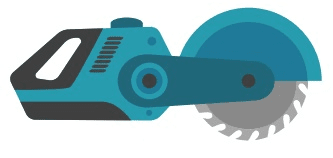7 Little Changes That'll Make A Huge Difference In Your Battery Powered Saws
The Rise of Battery-Powered Saws: A Comprehensive Guide
As the power tool market continues to evolve, battery-powered saws have actually gotten significant traction amongst both professional tradespeople and DIY lovers. Offering freedom from cords and gas, together with a shift towards sustainability, these tools are setting brand-new requirements in performance and effectiveness. Cordless Saws will explore the advantages of battery-powered saws, different types available on the marketplace, essential functions to search for, and a comparison table to help purchasers make informed choices.
The Advantages of Battery-Powered Saws
Battery-powered saws have changed the way work is carried out in numerous domains, consisting of building and construction, woodworking, and landscaping. Here are some of the essential advantages they offer:
Portability: With no cords to restrict movement, battery-powered saws can be used in various areas without the trouble of finding a power outlet.
Security: These saws generally pose fewer safety threats compared to gas-powered counterparts, as there is no threat of fuel spills and fewer emissions.
Relieve of Use: The lightweight style and ergonomic functions of battery-powered models make them easier to manage and operate, reducing fatigue throughout extended use.
Improved Technology: Modern lithium-ion batteries provide excellent power and can frequently match the efficiency of conventional gas engines, while also providing longer runtimes.
Environment-friendly Options: Battery-powered tools produce no direct emissions, making them an environmentally safe option to gas-powered tools.
Low Maintenance: Unlike gas-powered saws, which need regular maintenance like oil changes and fuel blending, battery-powered saws tend to be much easier to preserve.
Kinds Of Battery-Powered Saws
Battery-powered saws come in various designs, each tailored to fit particular jobs. Below are a few of the most popular types of battery-powered saws readily available today:
- Battery-Powered Circular Saws: Ideal for cutting through wood, plywood, and plastic.
- Battery-Powered Reciprocating Saws: Excellent for demolition and rough cuts, especially in tight spaces.
- Battery-Powered Miter Saws: Best for precision cuts at numerous angles, perfect for framing and molding.
- Battery-Powered Jigsaws: Great for elaborate cuts and curves in various products.
- Battery-Powered Chainsaws: A useful option for light tree work and yard upkeep.
Comparison Table of Battery-Powered Saws
Type of Saw
Common Battery Voltage
Suitable Use Cases
Key Features
Circular Saw
18V – 60V
Woodworking, cutting plywood
Adjustable base plates, laser guides
Reciprocating Saw
18V – 24V
Demolition, plumbing work
Tool-less blade modification, variable speed
Miter Saw
18V – 60V
Cut work, framing
Dual bevel, onboard laser
Jigsaw
12V – 20V
Complex cuts, woodworking
Orbital action, adjustable speed
Chainsaw
36V – 80V
Tree cutting, lawn cleanup
Tool-less chain tensioning, brushless motor
Features to Look For in Battery-Powered Saws
When picking a battery-powered saw, it's important to think about various aspects that can affect efficiency and user experience. Some crucial features include:
- Battery Life: Look for designs that supply a longer runtime to lessen disruptions during work.
- Weight and Balance: Lighter designs tend to be easier to handle, particularly throughout prolonged use.
- Blade Quality: Higher-quality blades cause smoother cuts and longer service life.
- Speed Settings: Tools with adjustable speed settings provide improved adaptability for different jobs.
- Resilience: The products utilized in construction can significantly impact the longevity of the tool, especially in extreme conditions.
Often Asked Questions (FAQ)
1. For how long do battery-powered saws last on a single charge?
The runtime of battery-powered saws varies from model to design and largely depends upon the battery size and the kind of work being done. Typically, a premium battery can last anywhere from 30 minutes to a number of hours under typical operational conditions.
2. Can I utilize my gas-powered saws blades on battery-powered saws?
No, gas saws and battery-powered saws typically have different specifications and blade attachments. It's recommended to utilize blades designed specifically for the kind of saw in concern to guarantee the very best efficiency and security.
3. Are battery-powered saws ideal for professional use?
Yes, lots of battery-powered saws provide performance that satisfies or exceeds that of gas-powered tools, making them suitable for sturdy applications. Nevertheless, specialists ought to think about a tool's specifications in regards to battery life and power output.
4. How do I keep a battery-powered saw?
While battery-powered saws require less maintenance than gas-powered tools, it is suggested to keep the tool clean, keep the battery correctly to prevent damage, and frequently inspect the blade for dullness or damage.
5. Is it more affordable to buy battery-powered saws with time?
The preliminary investment may be greater compared to gas-powered saws, but battery-powered saws tend to have lower maintenance expenses and do not require fuel, possibly leading to considerable cost savings in the long run.
Battery-powered saws are the future of cutting tools, boasting numerous benefits such as portability, security, and eco-friendliness. With various types available to suit different applications, it's essential for consumers to examine their particular needs before purchasing. By thinking about the different features and understanding the performance of various designs, users can find the best battery-powered saw to accomplish their tasks confidently and efficiently. As technology continues to enhance, it's likely that these tools will only end up being more powerful and flexible, more highlighting their role in modern-day woodworking and building.
